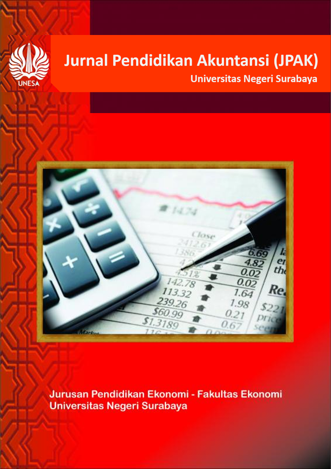Pengembangan E-LKPD Berbasis Contextual Teaching and Learning Pada Materi Harga Pokok Proses Dalam Meningkatkan Kemampuan Berpikir Kritis Siswa SMK
DOI:
https://doi.org/10.26740/jpak.v11n2.p211-227Keywords:
E-LKPD; CTL; costing process; critical thingking: Vocational High SchoolAbstract
This study aim to produce digital-based teaching materials in the form of E-LKPD using Contexual Teaching and Learning (CTL) by using the Application Flip Pdf Professional and integrated with activities that can train critical thinking skills of vocational students. This study uses the development model of Thiagarajan and Semmel (1974) which consists of 4 stages (define, design, develop, disseminate) due to time constraints the research was only carried out up to stage develop. The results of this study obtained are that the development of the E-LKPD that has been carried out can be categorized as very feasible with an average value of the validity test from material expert, language expert, graphic experts of 88.25%. The development of the E-LKPD received a very good response from students with a practicality analysis score of 97.19%. The E-LKPD that has been developed is effective in intensify students' critical thinking skills as evidenced by testing N-Gain score who obtained an average score of 61.83% which can be categorized as moderate based on the results of the critical thinking skills test. Thus, it can be concluded that the developed E-LKPD is categorized as valid and very feasible and can effectively improve the critical thinking skills of SMK students.
Downloads
Downloads
Published
How to Cite
Issue
Section
License
Authors who publish with this journal agree to the following terms:
- Authors retain copyright and grant the journal right of first publication with the work simultaneously licensed under a Creative Commons Attribution License that allows others to share the work with an acknowledgement of the work's authorship and initial publication in this journal.
- Authors are able to enter into separate, additional contractual arrangements for the non-exclusive distribution of the journal's published version of the work (e.g., post it to an institutional repository or publish it in a book), with an acknowledgement of its initial publication in this journal.
- Authors are permitted and encouraged to post their work online (e.g., in institutional repositories or on their website) prior to and during the submission process, as it can lead to productive exchanges, as well as earlier and greater citation of published work (See The Effect of Open Access).

Jurnal Pendidikan Akuntansi (JPAK) is licensed under a Creative Commons Attribution-NonCommercial 4.0 International License.
 Abstract views: 658
,
Abstract views: 658
, PDF Downloads: 710
PDF Downloads: 710



